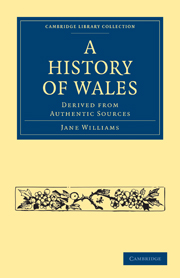Book contents
- Frontmatter
- PREFACE
- Contents
- CHAPTER I THE CYMRY OF ANCIENT BRITAIN
- CHAPTER II THE CYMRY AND THE ROMANS, B.C. 53—A.D. 54
- CHAPTER III THE CYMRY AND THE ROMANS, A.D. 54—96
- CHAPTER IV THE CYMRY AND THE ROMANS, A.D. 96—306
- CHAPTER V THE CYMRY AND THE ROMANS, A.D. 306—411
- CHAPTER VI THE CYMRY IN THE FIFTH CENTURY
- CHAPTER VII THE CYMRY AND THE SAXONS, A.D. 500—566
- CHAPTER VIII THE CYMRY AND THE SAXONS, A.D. 566—634
- CHAPTER IX THE CYMRY AND THE SAXONS, A.D. 634—819
- CHAPTER X THE CYMRY, THE SAXONS, AND THE DANES, A.D. 819—915
- CHAPTER XI THE CYMRY AND THE SAXONS, A.D. 915—948
- CHAPTER XII THE CYMRY, THE SAXONS, AND THE DANES, A.D.
- CHAPTER XIII THE CYMRY AND THE SAXONS, A.D. 1039—1063
- CHAPTER XIV THE CYMRY AND THE SAXONS, A.D. 1063—1091
- CHAPTER XV THE CYMRY AND THE NORMANS, A.D. 1091—1112
- CHAPTER XVI THE CYMRY AND THE NORMANS, A.D. 1091—1112
- CHAPTER XVII THE CYMRY AND THE NORMANS, A.D. 1137—1169
- CHAPTER XVIII THE CYMRY AND THE NORMANS, A.D. 1169—1194
- CHAPTER XIX THE CYMRY AND THE NORMANS, A.D. 1194—1240
- CHAPTER XX THE CYMRY AND THE ANGLO-NORMANS, A.D. 1240—1246
- CHAPTER XXI THE ANGLO-NORMANS AND THE CYMRY, A.D. 1246—1276
- CHAPTER XXII THE ANGLO-NORMANS AND THE CYMRY, A.D. 1276—1282
- CHAPTER XXIII THE ANGLO-NORMANS AND THE CYMRY, A.D. 1282—1287
- CHAPTER XXIV THE PLANTAGENET PRINCES AND THE CYMRY, A.D. 1327—1422
- CHAPTER XXV THE PLANTAGENET PRINCES AND THE CYMRY, A.D. 1422—1485
- CHAPTER XXVI THE TUDOR DYNASTY, A.D. 1485—1603
- APPENDIX
- INDEX
CHAPTER XIV - THE CYMRY AND THE SAXONS, A.D. 1063—1091
Published online by Cambridge University Press: 16 May 2011
- Frontmatter
- PREFACE
- Contents
- CHAPTER I THE CYMRY OF ANCIENT BRITAIN
- CHAPTER II THE CYMRY AND THE ROMANS, B.C. 53—A.D. 54
- CHAPTER III THE CYMRY AND THE ROMANS, A.D. 54—96
- CHAPTER IV THE CYMRY AND THE ROMANS, A.D. 96—306
- CHAPTER V THE CYMRY AND THE ROMANS, A.D. 306—411
- CHAPTER VI THE CYMRY IN THE FIFTH CENTURY
- CHAPTER VII THE CYMRY AND THE SAXONS, A.D. 500—566
- CHAPTER VIII THE CYMRY AND THE SAXONS, A.D. 566—634
- CHAPTER IX THE CYMRY AND THE SAXONS, A.D. 634—819
- CHAPTER X THE CYMRY, THE SAXONS, AND THE DANES, A.D. 819—915
- CHAPTER XI THE CYMRY AND THE SAXONS, A.D. 915—948
- CHAPTER XII THE CYMRY, THE SAXONS, AND THE DANES, A.D.
- CHAPTER XIII THE CYMRY AND THE SAXONS, A.D. 1039—1063
- CHAPTER XIV THE CYMRY AND THE SAXONS, A.D. 1063—1091
- CHAPTER XV THE CYMRY AND THE NORMANS, A.D. 1091—1112
- CHAPTER XVI THE CYMRY AND THE NORMANS, A.D. 1091—1112
- CHAPTER XVII THE CYMRY AND THE NORMANS, A.D. 1137—1169
- CHAPTER XVIII THE CYMRY AND THE NORMANS, A.D. 1169—1194
- CHAPTER XIX THE CYMRY AND THE NORMANS, A.D. 1194—1240
- CHAPTER XX THE CYMRY AND THE ANGLO-NORMANS, A.D. 1240—1246
- CHAPTER XXI THE ANGLO-NORMANS AND THE CYMRY, A.D. 1246—1276
- CHAPTER XXII THE ANGLO-NORMANS AND THE CYMRY, A.D. 1276—1282
- CHAPTER XXIII THE ANGLO-NORMANS AND THE CYMRY, A.D. 1282—1287
- CHAPTER XXIV THE PLANTAGENET PRINCES AND THE CYMRY, A.D. 1327—1422
- CHAPTER XXV THE PLANTAGENET PRINCES AND THE CYMRY, A.D. 1422—1485
- CHAPTER XXVI THE TUDOR DYNASTY, A.D. 1485—1603
- APPENDIX
- INDEX
Summary
I heard a voice which loudly to me called
That with the sudden shrill I was appalled;
Behold, said it, and by ensample see
That all is vanity and grief of mind;
Ne other comfort in this world can be
But hope of heaven and heart to God inclined,
For all the rest must needs be left behind.
Spenser: Ruines of Time.§ 1. a.d. 1063. If there had been a possibility at that conjuncture of subjecting Wales to the government of England, the powerful Harold would not have neglected it, but being a statesman as well as a general, and perceiving that the national feeling of the Welsh was then too strong for such a union, he obtained from the Bretwalda the appointment of Bleddyn and Ehiwallawn ab Cynfyn as joint and tributary sovereigns of Gwynedd and Powys. At the same time, it is said that he caused a law to be enacted, condemning every Welshman to lose his right hand who should be found without licence carrying any missile weapon upon the eastern side of Offa's Dyke.
Harold coveted the lordship of Porthyscwyd, situated near the Aust passage, and forming a part of the district kingdom of Gwent which Caradog ab Gruffydd ab Rhydderch ab Iestyn ab Owen ab Howel Dda inherited from his forefathers. The prince refused to resign the favourite spot, and the earl revenged himself and secured the property by causing Caradog to be proclaimed an outlaw, and Maredudd ab Owen ab Edwyn ab Eineon ab Owen ab Howel Dda to be invested by King Edward with the provincial and tributary sovereignty of Deheubarth.
- Type
- Chapter
- Information
- A History of WalesDerived from Authentic Sources, pp. 180 - 191Publisher: Cambridge University PressPrint publication year: 2010First published in: 1869

